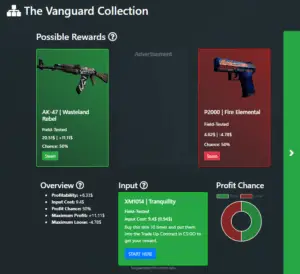BD124 Insights
Your go-to source for the latest news and informative articles.
Trade Up or Shut Up: The High-Stakes Game of CSGO Trade-Ups
Unlock the secrets of CSGO trade-ups! Learn to maximize your profits and avoid costly mistakes in this high-stakes gaming challenge.
Understanding the Basics: How Trade-Ups Work in CSGO
Counter-Strike: Global Offensive (CS:GO) offers an exciting feature known as trade-ups, which allows players to exchange multiple low-value skins for a chance to acquire a higher-value skin. The trade-up contract system is designed to encourage players to engage more with the game's skin economy. Players can select 10 skins of the same quality — whether they are Consumer, Industrial, Mil-Spec, or even more rare types — and trade them in to receive one skin of a higher quality. This mechanism not only adds a layer of strategy to skin management but also significantly impacts the CSGO economy as players weigh their options carefully before committing their items.
The trade-up process is fairly straightforward but requires thorough understanding and strategy. First, players must access the trade-up contract section of the game. Then, they can drag and drop their selected skins into the designated areas on the contract interface. Upon finalizing their selections, players will receive a single skin from the higher quality tier, determined by the outcome of a randomized algorithm. It is crucial to keep in mind that trade-ups are a gamble: while the potential for higher-value skins is enticing, there is also the risk of losing out on perfectly good skins. Therefore, it’s advisable for players to research and plan their trade-ups wisely to maximize their chances of coming out ahead.

Counter-Strike is a highly popular tactical first-person shooter game that has captivated millions of players worldwide. One of the most iconic weapons in the game is the awp, known for its one-shot kill capability and sniper precision. Players often compete in teams, employing strategies and teamwork to outmaneuver and outgun their opponents.
Maximizing Your Profits: Strategies for Successful Trade-Ups
Maximizing Your Profits through successful trade-ups requires a combination of strategic planning and an understanding of market dynamics. One effective approach is to research market trends thoroughly. This involves keeping tabs on popular products and their fluctuating values. By using tools like market analytics and community forums, you can identify which items are currently in demand and have the potential for a profitable trade-up. Additionally, consider creating a trade-up calendar that highlights the best times to make moves based on historical data and upcoming game updates or events.
Another essential strategy is to diversify your trades. Instead of focusing on a single category or item, broaden your scope to include a variety of trade-ups. This reduces your risk and increases your chances of landing a high-value item. When trading, make sure to evaluate the cost-to-value ratio of each item and the likelihood of a successful trade. Utilizing negotiation skills can also lead to more favorable deals, so always be open to discussions about item value, potential trade-offs, and opportunities that may arise from other traders.
Is It Worth the Risk? Analyzing the Pros and Cons of CSGO Trade-Ups
When considering CSGO trade-ups, it's crucial to analyze both the advantages and drawbacks before diving into this aspect of the game. On the positive side, trade-ups provide players with a unique opportunity to convert lower-tier skins into higher-value items. This mechanism appeals to many players, as it can potentially lead to significant profit margins. Additionally, the thrill of unpredictability adds an exciting dimension to the gameplay, transforming a simple skin collection into a strategic endeavor. Players often enjoy the excitement of rolling the dice, hoping for a high-value skin from their trade-up, which can enhance their overall gaming experience.
However, the risks associated with CSGO trade-ups cannot be overlooked. One of the major downsides is the inherent uncertainty; there's no guarantee that a trade-up will yield a desirable item, and players can end up wasting their lower-tier skins without receiving a worthwhile return. Furthermore, fluctuating market values can affect profitability, as the worth of skins can dramatically change over time. For players focused on maximizing their investment, it's essential to weigh these cons against the potential benefits, considering factors like market trends and their personal risk tolerance before engaging in trade-ups.